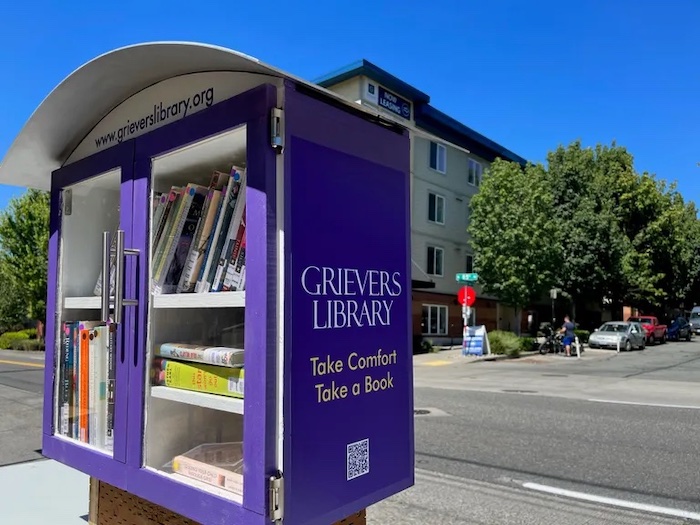
On Aug. 11, I will stand beside a book box stocked with 50-plus books for bereaved children, teens and adults and cut the ribbon to launch the first ever “Grievers Library.” This mini library, sited on a parking strip in front of a Seattle senior center, is the culmination of a concept that has taken 20 months to fulfill.
With the support of 90-plus volunteers and donors, we are giving away free books, love and compassion. Four more book boxes are planned to open in Seattle later this year.
It is both a small thing — just a wooden box of free books — and a big thing — a biblio-lifeline to grieving folks who want to understand why they can barely breathe, eat or sleep; who seek answers to troubling questions like, “Why has the most important person in my life died?” or, “Where has my person gone?” or, “Will I live through this?”
I know. When my 23-year-old son died by suicide in 2020, I was left with 100 questions and no answers. I was shattered, and I wanted an antidote to my anguish and despair. In those early months, I found books about grief written by grievers and grief experts alike provided a modicum of comfort. They said: I was not crazy; I was not alone; and that, over time, I would somehow survive.
Nonetheless, finding good grief books was just plain confusing. Our local library system listed 1,604 books under the subject of “grief.” The first was a thriller, the second a murder mystery … (Well, I guess it’s not surprising — Dewey gave “grief” short shrift — it’s #158 in his decimal system.)
Cognitively disabled with “grief brain,” I gave up and bought used books online and waited two weeks for them to arrive in my mailbox.
Over time, I discovered that public libraries don’t carry the majority of grief books because they are either self-published, too old or have low circulation. Conversely, they don’t buy near enough copies of the latest grief “bestsellers” to meet demand. So why not create mini libraries stocked with free grief books and place them around the city so everyone has 24/7 access?
A University of Washington library student joined our team and led collection development. Unlike Dewey, we parsed “grief” into 50 different categories and created color-coded tags for easy selection by overwhelmed grievers staring at 50 book titles.
Surprisingly, our biggest challenge was not buying, sorting and cataloging hundreds of grief books, nor building and painting five handsome book boxes. It was finding a facility that would let us install a grievers library on the parking strip in front of its building. After we received rejections from churches, libraries, businesses and local nonprofits, we proposed siting our book boxes in front of five Seattle community centers. To our dismay, the progressive, compassionate civic leaders at Seattle Parks, Department of Transportation and City Hall responded in concert, “We don’t think it’s appropriate for them to be installed in parks or in front of community centers.”
This is our cultural allergy to grief at work. A grievers library is not a gruesome gravestone that belongs in a cemetery; it is a medicine cabinet filled with love potions that belongs on our streets — for easy dispensing to those afflicted with heartache and despair.
Thankfully, the Greenwood Senior Center embraced our request to host a book box on the front of its property. Its people know grief and that biblio-therapy is a meaningful, positive resource to offer to our whole community. For this we are grateful. For more information: grieverslibrary.org
Complete Article ↪HERE↩!
